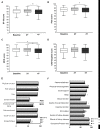Better health-related quality of life in kidney transplant patients compared to chronic kidney disease patients with similar renal function
- PMID: 34606505
- PMCID: PMC8489710
- DOI: 10.1371/journal.pone.0257981
Better health-related quality of life in kidney transplant patients compared to chronic kidney disease patients with similar renal function
Abstract
Renal functional deterioration is associated with physical and mental burdens for kidney transplant (KT) and chronic kidney disease (CKD) patients. However, the change in health-related quality of life (HRQOL) over time in KT patients compared to that of native CKD patients has not been evaluated. We addressed this issue using KT patients registered in the KNOW-KT cohort study and patients at CKD stage 1-3 registered in the KNOW-CKD cohort study. HRQOL scores were assessed using the Kidney Disease Quality of Life Short Form at baseline, 2-, and 4-years follow-up in 842 KT patients and at baseline and 5-year follow-up in 1,355 CKD patients. SF-36 scores declined at the 4-year follow-up, whereas CKD-targeted scores showed no change in the KT group. In contrast, CKD-targeted scores as well as SF-36 scores were decreased at the 5-year follow-up in CKD patients. When prognostic factors were analyzed for longitudinal HRQOL data over time, renal functions, diabetes, cardiovascular and cerebrovascular diseases, hemoglobin level, marital status, income, employment, and health care were significant prognostic factors. Furthermore, KT was an independent prognostic factor for better HRQOL. These results highlight that KT can offer a better HRQOL than that of CKD patients, even when renal function is similar.
Conflict of interest statement
The authors have declared that no competing interests exist.
Figures



Similar articles
-
Association between diabetes mellitus and health-related quality of life among patients with chronic kidney disease: results from the Chinese Cohort Study of Chronic Kidney Disease (C-STRIDE).Health Qual Life Outcomes. 2020 Aug 3;18(1):266. doi: 10.1186/s12955-020-01519-5. Health Qual Life Outcomes. 2020. PMID: 32746855 Free PMC article.
-
Perceived Health and Quality of Life in Patients With CKD, Including Those With Kidney Failure: Findings From National Surveys in France.Am J Kidney Dis. 2020 Jun;75(6):868-878. doi: 10.1053/j.ajkd.2019.08.026. Epub 2019 Dec 23. Am J Kidney Dis. 2020. PMID: 31879215
-
Health-related quality of life among patients with comorbid diabetes and kidney disease attending a codesigned integrated model of care: a longitudinal study.BMJ Open Diabetes Res Care. 2020 Jan;8(1):e000842. doi: 10.1136/bmjdrc-2019-000842. BMJ Open Diabetes Res Care. 2020. PMID: 31958294 Free PMC article.
-
Mapping health-related quality of life after kidney transplantation by group comparisons: a systematic review.Nephrol Dial Transplant. 2021 Dec 2;36(12):2327-2339. doi: 10.1093/ndt/gfab232. Nephrol Dial Transplant. 2021. PMID: 34338799 Free PMC article.
-
Health-related quality of life in patients with chronic kidney disease.Expert Rev Pharmacoecon Outcomes Res. 2021 Feb;21(1):43-54. doi: 10.1080/14737167.2021.1854091. Epub 2020 Dec 17. Expert Rev Pharmacoecon Outcomes Res. 2021. PMID: 33213186 Review.
Cited by
-
Outcomes of acute ischemic stroke in kidney transplant recipients: An analysis of US Nationwide inpatient sample.Transl Neurosci. 2022 Sep 24;13(1):327-334. doi: 10.1515/tnsci-2022-0247. eCollection 2022 Jan 1. Transl Neurosci. 2022. PMID: 36238191 Free PMC article.
-
Polish validation of the Transplant Effects Questionnaire.Front Psychiatry. 2023 Sep 18;14:1155672. doi: 10.3389/fpsyt.2023.1155672. eCollection 2023. Front Psychiatry. 2023. PMID: 37791133 Free PMC article.
-
Maintenance Immunosuppression in Kidney Transplantation: A Review of the Current Status and Future Directions.J Clin Med. 2025 Mar 8;14(6):1821. doi: 10.3390/jcm14061821. J Clin Med. 2025. PMID: 40142628 Free PMC article. Review.
-
Predictors of self-care in kidney transplant patients according to preoperative dialysis: A comparative study.Heliyon. 2024 Nov 9;10(24):e40237. doi: 10.1016/j.heliyon.2024.e40237. eCollection 2024 Dec 30. Heliyon. 2024. PMID: 39802610 Free PMC article.
-
The impact of chronic kidney disease on health-related quality of life (HRQoL): key insights from a hospital-based cross-sectional study.J Bras Nefrol. 2025 Jul-Sep;47(3):e20240229. doi: 10.1590/2175-8239-JBN-2024-0229en. J Bras Nefrol. 2025. PMID: 40531614 Free PMC article.
References
Publication types
MeSH terms
Substances
LinkOut - more resources
Full Text Sources
Medical

